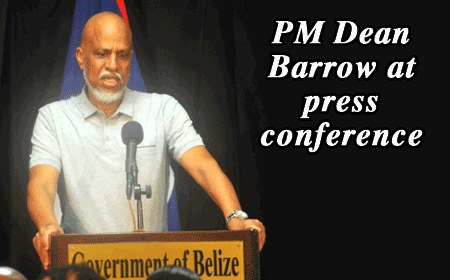BELIZE CITY, Thurs. May 9, 2019– Having Guatemala’s claim to Belizean territory adjudicated at the International Court of Justice (ICJ) — which was endorsed by the majority of Belizean voters through a “yes” vote in the national referendum held yesterday, May 8 — is a lengthy process that will take quite a few years before the court hears the case and make its final determination, which will be binding on both countries.
It could take up to ten years before the ICJ hands down its ruling on the case between Belize and Guatemala.
Today, at a press conference at the Belize City Civic Center, Prime Minister Dean Barrow explained the process that has to be followed for both countries to take the case to the ICJ.
Barrow said that by next week, there will be a meeting of the House of Representatives, at which the government will amend the Maritime Areas Act.
Belize signed the Maritime Areas Act into law as part of its negotiating strategy when it decided to accept a 3-mile limit to its territorial sea, instead of the 12-mile limit that it is entitled to under the Law of the Sea.
Barrow said that the Maritime Areas Act was passed to aid in the negotiations with Guatemala. Now that we are going to court, there is no need for the MAA to continue, he said.
After the Maritime Areas Act is amended, Barrow said, the government will formally inform the ICJ of the referendum results, essentially telling the court that the case is indeed being brought before them.
“We have months to do that,” Barrow said.
After Belize informs the court that the process of submitting the case is in effect, Guatemala will have one year to put forward their “memorialization,” or claim.
Belize will also have one year to put forward their memorialization, after Guatemala has submitted theirs.
Following that, both sides will have an additional six months to reply to each other’s case.
Barrow stressed that the amendment to the Maritime Areas Act will be done so that Belize has its full entitlement to territory that is covered under the 1859 Treaty.
Barrow said that he would have liked to go to the House with the amendment to the MAA next week, but he has to give the Opposition enough time to study the proposed amendment.
Barrow was also asked if the government would try to work out a Sarstoon Protocol.
Barrow said that he raised that issue when the Guatemalan president, Jimmy Morales, visited Belize for the SICA Conference, and that he told him that “we should try to come to some arrangement.”
Nothing was agreed upon by the two countries, however.
Barrow was also asked whether the Belizean public will be made aware of the details of Guatemala’s claim after they have submitted that claim to the court.
Barrow said he is not sure, but he plans to find out.
In addition, he was asked exactly what is it that Guatemala wants from Belize.
“As soon as we know, we should communicate that,” Barrow replied.
Barrow said that the government has hired three firms to work on Belize’s case. The Prime Minister, however, could not say exactly how much money it will cost to take Belize’s case to the ICJ.

